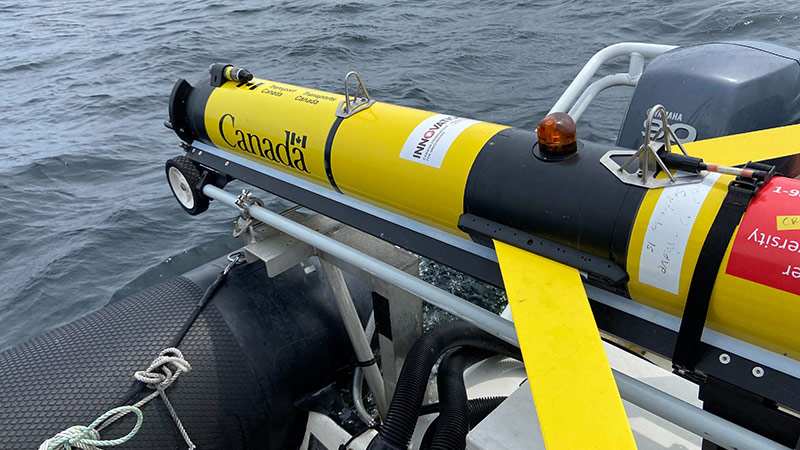Whale detection program expanded in Canadian waters to protect North Atlantic right whales and help mariners
Author: UNB Newsroom
Posted on Jun 27, 2024
Category: Research , Press Releases

North Atlantic right whales are amongst the most endangered whale species on the planet, with their population hovering around a mere 350 individuals. Each summer, the whales move northward in search of food, bringing them into the Gulf of St. Lawrence—a high-traffic route for vessels entering Canadian ports and a major area for commercial fisheries. This has increased the risk of ship strikes and fishing entanglements for the species.
Vessel strikes are a leading cause of mortality for this species. Between U.S. and Canadian waters, at least 15 right whales have died from vessel strikes since January 2017, and at least 40 mortalities have occurred from all causes in that time. Due to these human-induced stressors, as well as lower calving rates since 2010, experts predict that right whales could become extinct in as little as 20 years.
The University of New Brunswick (UNB), the Ocean Tracking Network (OTN), Transport Canada and Woods Hole Oceanographic Institution have been collaborating since 2020 to monitor right whales in near real-time in shipping lanes in the Gulf of St. Lawrence using underwater robots called gliders. When right whale calls are detected in shipping lanes, Transport Canada issues mandatory speed reduction orders for all vessels more than 13 metres in length to decrease the risk from vessel collisions.
In 2021, UNB and OTN were jointly awarded $2.8 million in project funding from Transport Canada for monitoring of North Atlantic right whales for five years in the Gulf of St. Lawrence using gliders. This effort built on pilot work in previous years in the Gulf showing that glider-based monitoring was feasible.
The funding also allowed OTN to purchase a new G3s Slocum glider equipped with an upgraded hydrophone that is better integrated into the glider, leading to more streamlined flight. In 2023, an additional $300,000 was donated to the project by the Murphy Family Foundation in partnership with the McKenna Institute at UNB.
This summer, the glider-based Passive Acoustic Monitoring (PAM) program—that detects right whales in the Gulf of St. Lawrence shipping lanes—is expanding from two gliders to three to cover a larger area encompassing three Dynamic Shipping Zones. Expanded use of autonomous robots for detecting whales in the main shipping lanes increases surveillance and protection efforts for right whales.
“We are thrilled to work with Transport Canada to significantly expand the Robots4Whales program, which will help protect right whales and reduce the incidence of precautionary slowdowns for transiting vessels,” says Kim Davies, associate professor of biological sciences, UNB.
Transport Canada uses a combination of aerial and underwater acoustic (glider) monitoring platforms to establish where and when right whales are present in the Gulf of St. Lawrence. The two methodologies complement each other and allow for a greater area of the Gulf of St. Lawrence to be monitored. As a precautionary measure, Transport Canada has issued speed restrictions at times and in places where aerial surveillance for right whales could not be undertaken due to weather conditions, and where no other monitoring was occurring. Gliders can monitor in all weather conditions, so an advantage of the expanded glider program is that it reduces the need for precautionary speed limits, which is beneficial to the shipping industry.
“The work is so important, and the consequences of failure are high both for the right whale and for the communities that depend on the fishing and shipping industry for their livelihoods. So far, everyone is winning,” says OTN’s executive director, Dr. Fred Whoriskey. “No reports of right whale deaths in the Gulf of St. Lawrence since 2017, and we have minimized disruption to industry in the area. I am grateful to the harvesters and ship operators who have cared enough about the whales to do all in their power to help.”
Photo credit: CEOTR glider group
Media contacts
- Kimberley Davies, Associate Professor, University of New Brunswick: kim.davies@unb.ca.
- Marcia Seitz-Ehler, Interim Director of Communications, University of New Brunswick: talktous@unb.ca.
- Fred Whoriskey, Executive Director, Ocean Tracking Network: fwhoriskey@dal.ca.
- Anja Samardzic, Communications Manager, Ocean Tracking Network: anja.samardzic@dal.ca.
